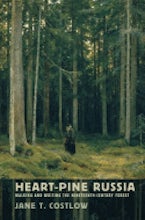Heart-Pine Russia elegantly combines scholarship and a personal love (and experience) of the forest itself.... This work is a wonderful contribution to the study of Russia's aesthetic and spiritual history and a rare offering to the world of environmental history. Specialists and educated readers alike will take delight in this literary journey through the dense and mysterious forests of European Russia.
- Amy Singleton Adams (Canadian-American Slavic Studies) Each chapter of Heart-Pine Russia offers a different perspective on the symbiosis of the human and the forest in Russia, but the book's real strength arises from the combination of its parts, the tracing of the many ways in which the Russian forest, mysterious yet sustaining, played an essential role in the development of Russian culture and consciousness. Like any good ramble in the woods, Heart-Pine Russia offers new understanding of the familiar, encounters with unexpected, and a deepened sense of the interconnection of it all with ourselves.
- Andrew R. Durkin (Slavic and East European Journal) In this beautifully written and researched volume, Jane T. Coslow takes us on a journey into the forests of European Russia through the eyes of the nineteenth-century literary figures, naturalists, and painters who walked its floors and thought deeply about the land they walked on..I cannot overstate the value of this book for literary and cultural historians, environmentalists, and for anyone interested in how research and personal narrative can be elegantly woven together. Costlow's work succeeds in laying out for us how Russia's European forests have served as icons of national identity. It also urges us to sit up and take notice of our failure to be proper stewards of the land on which we live.
- Adele Barker (Slavic Review) Strolling for the first time in unknown woodlands – seeing, smelling, and hearing the curious and obscure – our experience is happiest and truest when we resist the temptation to interpret our sensations in terms we understand, and allow ourselves to acknowledge and appreciate difference. In its best moments, Heart-Pine Russia produces just this kind of unexpected epiphany. If outstanding universal values exist, this, I'm sure, is one.
- Killian Quigley (MAKE Literary Magazine,) This book is a landmark achievement. It opens up enormous swaths of heretofore unexplored territory, and it provides Slavists (and, for that matter, non-Slavists, should they branch out and read it) with a sophisticated, supple, and manifestly interdisciplinary model for thinking about the relationship between humans and the natural world. It is the first sustained and intellectually rigorous attempt in any language to train an ecocritical lens onto nineteenth-century Russian culture. In this sense it might be said that it does for the Russian field something akin to what Lawrence Buell's seminal 1995 work The Environmental Imagination did for American Studies.
- Thomas Newlin (The Russian Review) This erudite study of the Russian forest in 19th-century literature and art... argues that the forest holds a particularly mythologized place in the Russian cultural imagination. Each of the book's six chapters addresses a different author or artist.... This look at the Russian forest in literature and the arts is overdue. As an added plus, it includes ample reproductions of 19th-century paintings in both color and black and white.
(Choice)
